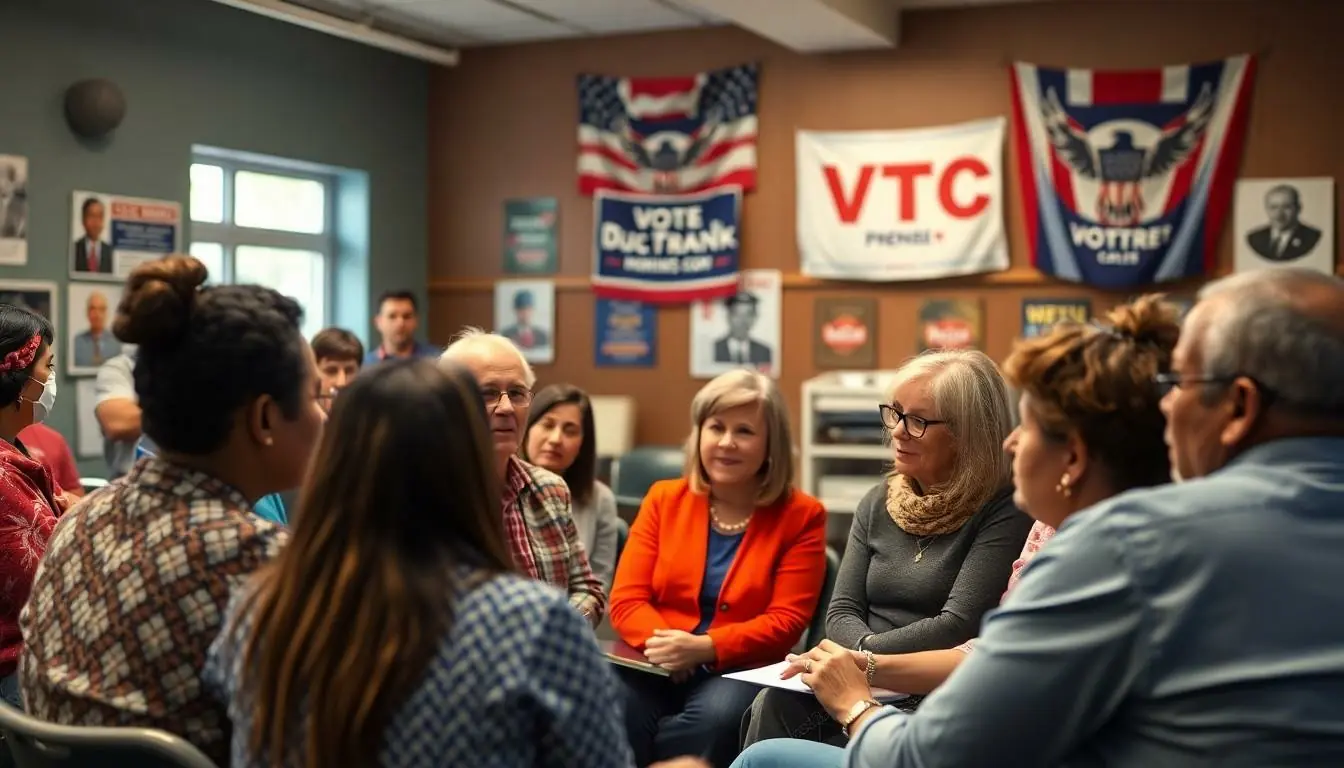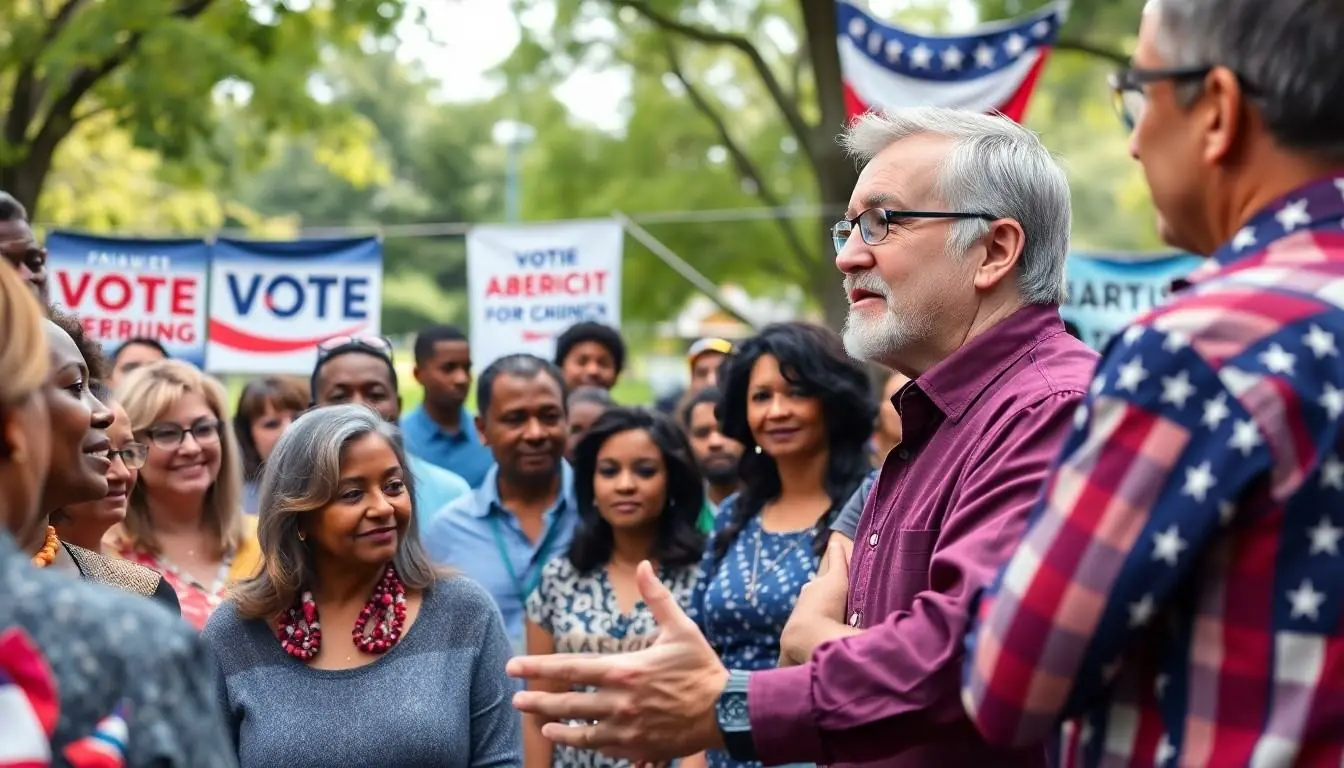Table of Contents
ToggleIn the high-stakes world of political campaigns, standing out is crucial. With candidates vying for attention like kids in a candy store, one effective strategy can make all the difference. Enter the art of storytelling. It’s not just for bedtime anymore; it’s a powerful tool that transforms dry policy proposals into relatable narratives that resonate with voters.
Imagine a candidate weaving their life experiences into a compelling story that tugs at heartstrings and evokes a sense of community. It’s like turning a mundane campaign speech into a blockbuster movie—complete with heroes, villains, and a quest for change. By connecting on a personal level, campaigns can inspire loyalty and drive voter turnout. In a world where attention spans are shorter than a cat video, storytelling emerges as the secret sauce to captivate audiences and rally support.
Understanding Political Campaigns
Political campaigns rely on various strategies to connect with voters. One effective method is the use of storytelling. Storytelling transforms dry policy proposals into relatable narratives, allowing candidates to resonate with constituents. Candidates gain an emotional edge by sharing personal experiences or community stories. These narratives evoke feelings and foster a sense of belonging.
Voter engagement becomes paramount in crowded elections. Candidates use storytelling to differentiate themselves effectively. When narratives are compelling, they inspire loyalty among supporters. Engaged voters readily share their positive experiences, amplifying campaign messages through word of mouth.
Policy discussions can often feel abstract or detached. Stories convert complex issues into relatable scenarios that outline real-life implications. Voters better understand the significance of policies when they see concrete examples of their impact.
Building a community around campaign themes is essential. Candidates embrace storytelling to cultivate grassroots support, encouraging volunteers and advocates. Campaign events become platforms for sharing touching stories, further solidifying connections with the electorate.
Also, social media amplifies the effectiveness of storytelling in political campaigns. Candidates share snippets of their narratives across various platforms. These stories travel quickly, reaching wider audiences beyond traditional campaign structures. Real-time engagement fosters dialogues and encourages voter participation.
Ultimately, storytelling stands as a vital strategy for political campaigns. It transforms mundane political discourse into emotionally compelling narratives that reach voters on multiple levels. By leveraging this approach, candidates not only capture attention but also drive higher voter turnout.
Key Components of Effective Strategies

Political campaigns rely on specific strategies to engage voters effectively. A strong approach involves clear identification of the target audience and tailored messaging.
Target Audience Identification
Identifying the target audience is crucial for political campaigns. Campaign teams analyze demographic data to understand who will support their candidate. They consider factors like age, gender, location, and socio-economic status. Knowing these details helps campaigns craft messages that resonate with diverse voter groups. Moreover, surveys and focus groups offer insights into voter preferences and motivations. Adjusting strategies based on feedback increases campaign effectiveness. Campaigns that effectively identify and understand their audience create a stronger connection, fostering loyalty and advocacy among supporters.
Message Development
Message development is vital for clear communication in political campaigns. Candidates articulate their values and policy positions through concise messaging. Crafting messages that align with voter concerns makes them more relatable. Additionally, using storytelling techniques enhances the emotional impact of the messages. Campaign teams focus on clarity and consistency, ensuring every platform conveys the same key points. Personalized narratives tie into broader campaign themes, making candidates more approachable. Results from voter engagement initiatives showcase that well-developed messages not only resonate with the audience but also prompt action, resulting in increased voter turnout.
One Effective Strategy Used by Political Campaigns
One impactful strategy in political campaigns involves engaging voter outreach. Candidates must connect directly with their constituents. Organizing community events creates opportunities for face-to-face interactions. These events foster personal relationships, enabling candidates to listen to voter concerns. Engaging in local forums or town halls allows candidates to demonstrate their commitment to addressing issues that matter. Innovative outreach techniques, such as door-to-door canvassing, further enhance connections.
Engaging Voter Outreach
Effective voter outreach encourages active participation. Campaigns often utilize phone banking or texting programs to reach out to voters. Additionally, volunteers play a critical role in spreading campaign messages. Engaging local advocates can amplify support within neighborhoods. Recruit supporters who share the candidate’s values to share their stories, creating relatable connections. Surveys can help identify key voter issues, guiding outreach efforts. Personalized communication resonates better, increasing the chances of positive response and fostering loyalty.
Utilizing Social Media Platforms
Social media serves as a vital tool in modern political campaigns. Candidates reach a broader audience through platforms like Facebook, Twitter, and Instagram. This digital medium facilitates direct engagement with voters, enabling real-time interactions. Creative content, such as videos and infographics, captures attention effectively and helps convey campaign messages. Additionally, sharing user-generated content from supporters fosters a sense of community. Running targeted ads allows campaigns to reach specific demographic segments efficiently, ensuring messages resonate. An active online presence strengthens candidate visibility and engagement, driving voter turnout.
Case Studies of Successful Campaigns
Barack Obama’s 2008 campaign exemplifies effective storytelling. By focusing on hope and change, it crafted relatable narratives that resonated with voters across diverse demographics. Campaign teams utilized social media to engage younger audiences, amplifying their reach through platforms like Facebook and Twitter.
Another notable example is the campaign of Alexandria Ocasio-Cortez in 2018. Ocasio-Cortez connected deeply with her community by sharing personal experiences and emphasizing grassroots organizing. She effectively used Instagram to showcase her daily campaign activities, making her approachable and relatable.
The 2016 campaign of Donald Trump demonstrated a different approach to messaging. Trump’s straightforward style appealed to voters seeking an anti-establishment candidate. He repeatedly reinforced themes of economic nationalism, directly resonating with constituents feeling challenged by globalization.
In 2004, Howard Dean’s campaign successfully utilized technology for voter outreach. By leveraging email lists and online fundraising, Dean mobilized grassroots support at an unprecedented scale. His innovative use of digital platforms helped revitalize traditional campaign strategies.
The recent campaign of Joe Biden in 2020 also highlights the power of messaging. Emphasizing unity and healing, Biden addressed the emotional needs of voters during a tumultuous period. His campaign effectively utilized television and online ads to provide clear, consistent messaging that resonated with many Americans.
Each of these campaigns utilized storytelling and engagement strategies to form emotional connections with constituents. Understanding voter demographics and employing innovative communication methods enabled these candidates to build stronger relationships and encourage voter turnout.
Storytelling stands out as a powerful strategy in political campaigns. By weaving personal narratives and community experiences into their messaging, candidates can create emotional connections that resonate deeply with voters. This approach not only enhances engagement but also fosters a sense of belonging among constituents.
As campaigns continue to evolve, the ability to craft compelling stories will remain essential for candidates seeking to differentiate themselves. Embracing innovative outreach methods and leveraging social media will further amplify these narratives, driving voter turnout and building lasting relationships. Ultimately, successful political campaigns will rely on the art of storytelling to inspire and mobilize their supporters effectively.


